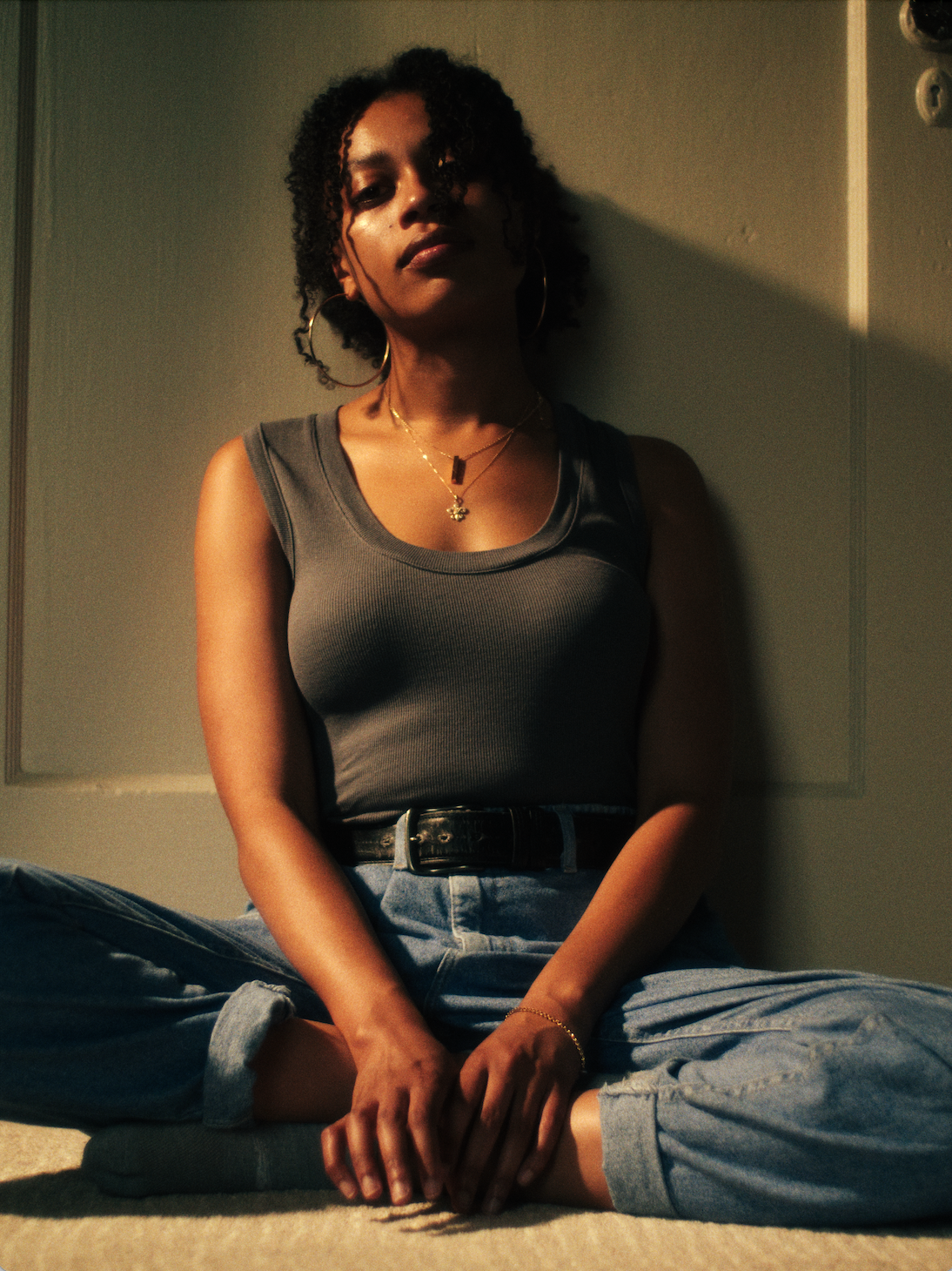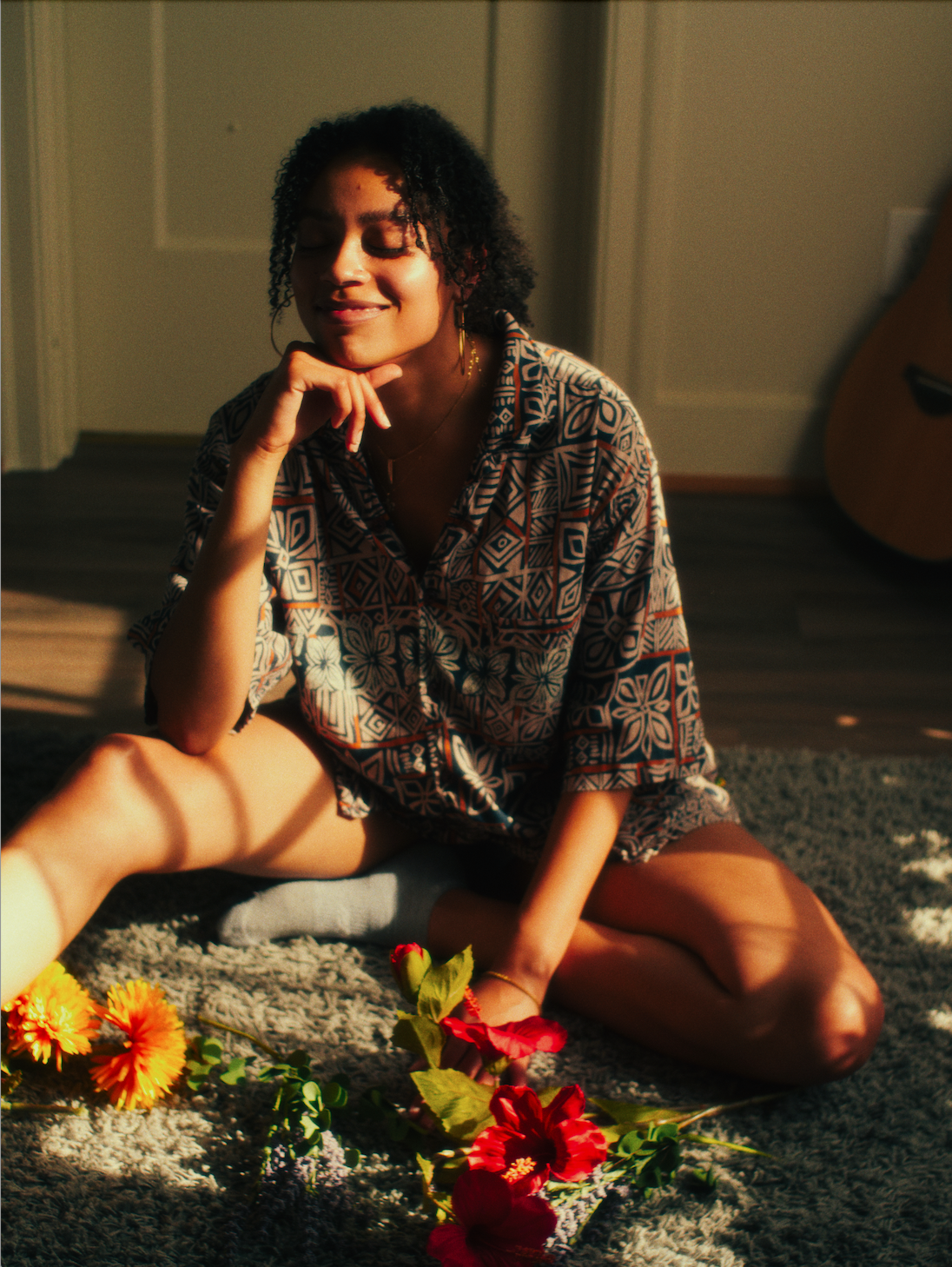
Interviewed by Moriah Katz
Can you start by telling us about yourself?
Hello! I'm August. I am a singer-songwriter/musician. I've been studying music for most of my life. I tell people that I'm Indie Soul, when they ask. Somewhere in the lines of acoustic singer/songwriter, guitar stuff, who also grew up listening to Destiny's Child. Whatever that mixture is.
You said that "[you] hope [your] music can showcase the power that comes with vulnerability, and in turn, help [you] to step into more of yourself with each written lyric." What role has music played in you coming into your own, both as an artist and an individual?
It's something that always allows me to open back up and let everything back in. And sometimes if I can't say something, or I can't understand a situation, I just write a song about it, even if it's not with lyrics or anything. I can just write a melody. And it helps [me] reflect on the feelings that I'm going through during the time.

August Lee Stevens sings and produces ‘Senses’ live.
Can we talk about “Senses”? What moment did the song arrive out of?
There was just a year where I was in this - what is it called? - a situationship - where I wasn't expressing how I was feeling because I was too scared. I was shutting down my emotions because I just didn't want to deal with them. That was building up for a whole year.
It was my freshman year of college last day, everyone was going home. I was in my feels and on the floor by myself…upset about the whole year and how I wasn't being authentic to what I was feeling. And I sat down and wrote the song. And it's kind of just a reflection on that state of not feeling safe enough in a relationship - or even a friendship - to be authentic and to express what I was going through. It was a culmination of me exploding really, and being like, "Okay, I never said what I wanted to. So here's me writing it in a song. You'll have to listen to it that way.”
Has the way that you feel about the song changed since you wrote it? Have you grown around it and in ways that you can see?
Yeah, it's changed a lot. Originally, when I would sing it - and originally when I wrote it - I was in this heightened emotional state. Just kind of sad. But since playing it [with my band] a lot, a change of emotion has come. Because now there's new energy that we're inputting into it. And - I tell them this all the time - playing with them, I can hear parts of their soul and artistic expression in my songs. So it doesn't feel like it's mine anymore, which is cool, because now the grief that was originally associated with it is gone. And now it's the song that I can go to when we’re performing that I can input whatever other emotions I want to. The melody still makes me emotional just because of the way that the sounds come together. Even if it's not a negative feeling, I can still put it in that song. It's kind of like this blank slate that I have, if that makes sense.
What did releasing the single allow for you to do as a musician and as a person?
So much freedom. There was a lot of stress and tension around the whole process of releasing it. We started recording it right before COVID, and then we were all in different parts of the world. So, there was a lot of tension in the last few months leading up to releasing it because of all of that. But it was also exciting. And it was really cool honestly, to release it and just be honored that so many people from around the world were involved. It's such a simple song in my eyes. It's really small. It feels bigger than what it deserves honestly, because there are so many people involved and the production was way grander than what I was envisioning.
There was that relief and then also, just I feel in my own music journey, there is some sense of imposter syndrome. I just feel like I'm on a weird timeline because I'm getting into music so late. And I look at all these people that like I idolized, or that I look up to musically, and they all started a lot sooner than I did […] I felt like I wasn't a real artist or a real musician until I actually released it.
You began your music career while studying as a full-time student. Was there a specific moment where you decided to prioritize music?
I dedicated so much of my time to Santa Cruz, really, and no time to myself. I thought, “I'm graduating soon. And I want to be proud of one thing that I did. If there is no more school, what do I have to look back at and say that I've put my all into, and I'm proud of it?”
I had also just gone through a breakup with the subject matter of “Senses”. After all of that, I was like, “I think I want to focus on me. I can finally step into expressing myself fully without caring about whose feelings have been hurt.”
And how was your practice changed over time?
I went to an art school for middle through high school. And I love that school; it's part of the reason I'm here now. But their environment was a lot to deal with. It was so competitive. It wasn't fully helpful for people like me, that are susceptible to comparison and impostor syndrome.
I was burnt out for a while, practicing every day, all day. Now my practice is more out of love.
It's like, “I love playing, I had a rough day,” or like, “I'm really happy. And I just want to express that so I'm gonna go play.” I want to practice [the traditional way], but a lot of [my current practice] is just like, “Go to the piano and practice just playing from the heart.”

You've listed Hozier, Alicia Keys and Lauryn Hill as your greatest influences. Can you talk about how their footprint shows up in your work?
Lauryn Hill - to me - was someone who kind of had a softer voice. I found a lot of power in that. I don't think of my voice as a big Black voice, you know, like the kind that gets associated with R&B and Soul. And I don't always feel like I fit into that [genre]. And I feel like [I get put in that category] just because that's what people know as Black music and I'm a Black person. So they're like, “Okay, you're like a belter. You got like the churchy blues vibes and stuff”. I don’t. I wish I did, but my voice can't do that. I know my limits.
Alicia Keys was also someone who I think - because I was a Black girl in piano - my mom wanted me to find encouragement [in]. She was like, “Look, you can do it because she did it!” And I remember, I think I was nine, I got [an Alicia Keys album] as a birthday present. And I was like, “Oh my gosh, look at this Black lady playing classical piano!” because did a cool rendition of - I think it was Nocturne and C sharp minor, Chopin. I found a lot of love and joy from that album.
And then Hozier just because that's when I started getting into guitar more and wanting to actually play it. I loved his fingerpicking; you can hear that in my music. I spent the first summer of COVID teach[ing] myself [his songs] through YouTube videos.
What do you hope the audience will gain from your work?
Part of it - selfishly - is I just want to be seen, and I want to feel like I'm seen for who I am. I know I don't fully express that [desire to be witnessed] when I'm speaking with people. But if you won't listen to me speaking, you're gonna hear my song. And it'll tell you how I'm really feeling.
Another thing is, I hope I can kind of do the same thing that a lot of my inspirations did. I want people to feel like they're enough. I want people to feel like they can be inspired, and they can share themselves.
What is next for you?
I have two songs I'm working on now. One is another acoustic song that I really love. It's honestly one of my favorites. That's coming up around January/February, as well as another song. It's one of the biggest songs that I've ever done. Not vocally, but stylistically. It's going for 1960s Aretha soul. It's big. I'm intimidated a lot. But it's really fun. And I can't wait for it to come out.
That is the official end of my questions. Is there anything else you’d like to add?
I've never been without support. Everyone that's offered encouragement: my band that plays with me or, [people who] recommend me for shows, just thank you so much. And thanks for putting up with me. Because I know, I am a Libra and I have trouble making decisions sometimes.





